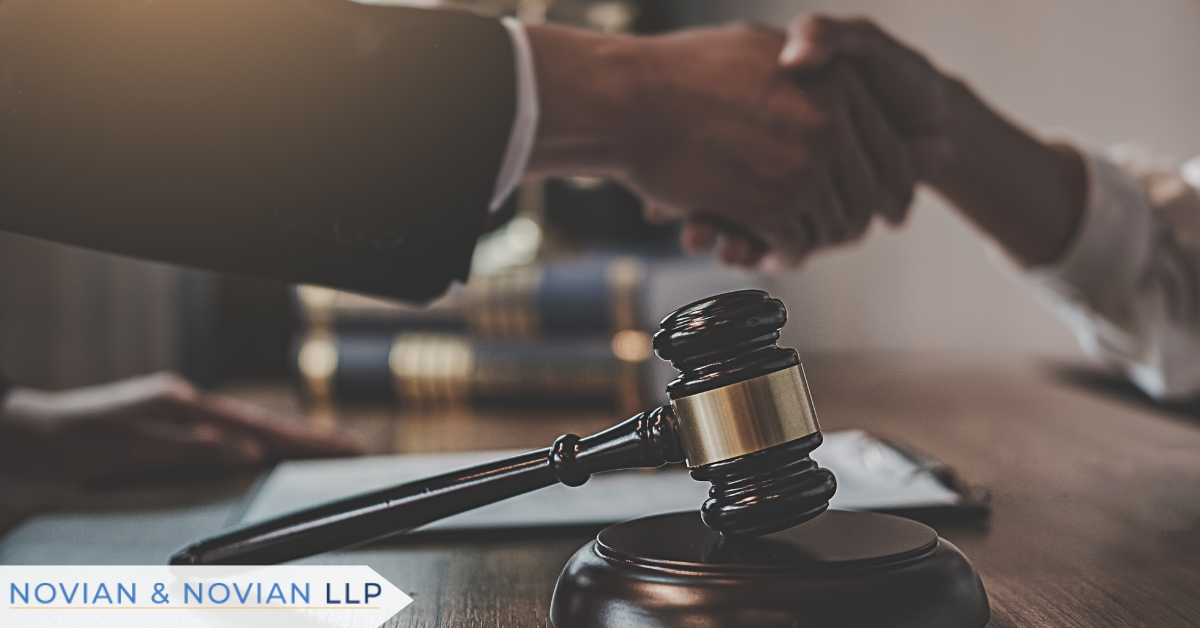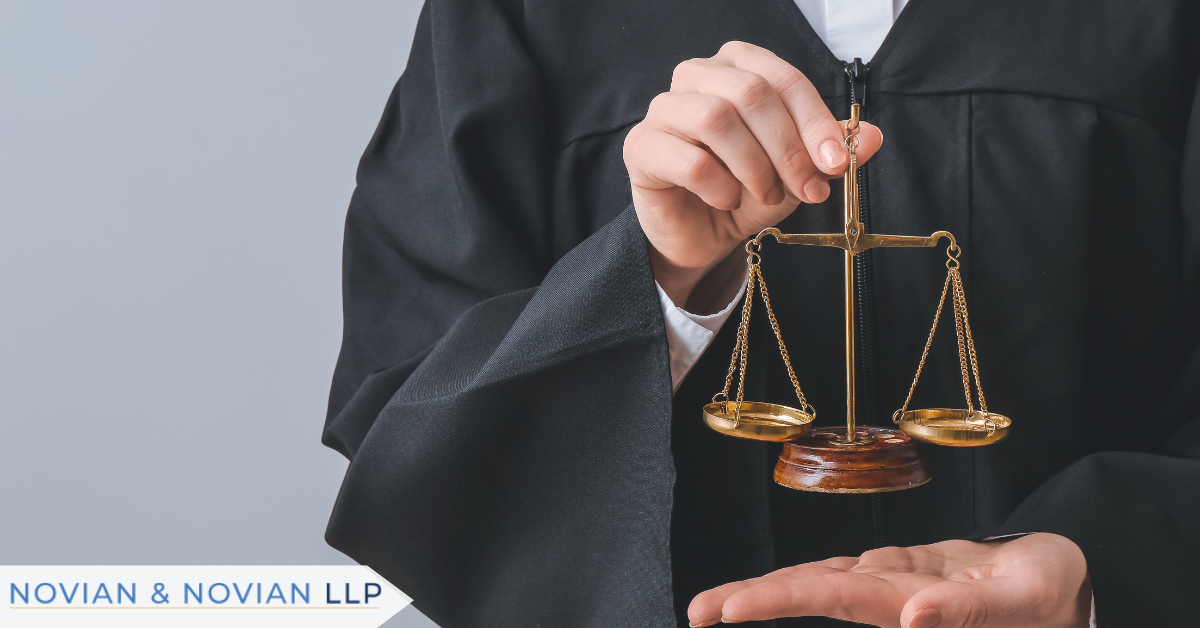Hiring the right personal injury attorney can make or break your case. Unfortunately, not all attorney-client relationships work out. Sometimes, there could be a need to switch attorneys in a personal injury case, and you may be wondering if it is possible.
Yes, you can switch attorneys at almost any point in your personal injury case. You are legally entitled to change lawyers if you are dissatisfied with your current legal representation. However, timing matters. If your case is close to trial or a settlement is imminent, switching attorneys could potentially delay your case.
At Novian & Novian, we specialize in catastrophic injury cases and are committed to offering compassionate and strategic advice. With over 35 years of experience, you can trust us with your legal representation. Contact us today for a free consultation.
This post will cover common reasons people switch attorneys mid-case and whether you are allowed to change attorneys during a personal injury case. It will also let you know how the process works and what to expect.
Table Of Contents
Can You Switch Attorneys in a Personal Injury Case?
Yes, you can switch attorneys in a personal injury case. The foundation of any attorney-client relationship is your autonomy and trust in your legal representation.
Therefore, if you no longer feel confident in your current attorney’s strategy or believe your best interests are not being fully represented, you are not obligated to stay with that lawyer or law firm. Clients have the legal right to change lawyers at any point during the legal process, whether it’s early on or in the middle of a case.
If your current attorney is not meeting expectations, switching attorneys could help you get back on track toward a fair trial or settlement. Many personal injury lawyers work on a contingency basis, which means you typically do not face additional costs when switching legal representation.
Common Reasons People Switch Personal Injury Lawyers
There are several common reasons people decide to switch personal injury lawyers in the middle of a case. One of the biggest frustrations is a lack of communication. Clients expect phone calls and updates, and when these aren’t returned, confidence in the attorney quickly fades. Others experience disagreements about case strategy or settlement negotiations, such as where the current attorney’s approach feels too aggressive, too passive, or simply not in line with the client’s goals.
Some individuals lose trust in their lawyer’s ability to deliver results, especially if the attorney lacks experience handling personal injury claims or is unable to answer questions in detail. There are also cases where unprofessional behavior or ethical concerns prompt clients to seek a new law firm. Long delays in the legal process without reasonable explanation can also lead to a breakdown in the attorney-client relationship, especially when these delays put the personal injury claim at risk with the insurance company or court.
When You Should Not Switch Personal Injury Lawyers
While it is your right to switch lawyers, there are certain times when changing attorneys might not be in your best interest. For example, if your case is close to trial, switching legal counsel may cause unnecessary time delays or complicate your strategy with other parties involved in the case. In such situations, it’s often better to speak directly with your current lawyer or legal team before making any final decision.
Changing attorneys out of frustration without first communicating your concerns can backfire, especially if the issue could have been resolved internally. Additionally, if the switch would significantly delay your case or create legal jeopardy, you should weigh the pros and cons carefully. Always consider how a new law firm will take over your case file, interact with the previous attorney, and maintain the continuity needed to pursue your claim successfully.
When Is the Best Time to Switch Personal Injury Attorneys?
If you’re considering changing lawyers during a personal injury case, timing matters. While you have the legal right to switch attorneys at any point during your case, the best time to make the change is as early as possible to avoid unnecessary complications, delays, or disruptions in your legal strategy.
Ideally, if you’re unhappy with your current legal representation, the best time to switch is before a lawsuit has been filed. At this early stage of the personal injury claim process, there’s typically less paperwork, fewer interactions with the insurance company, and no court-imposed deadlines. This makes it easier for your new personal injury attorney to step in, assess the situation, and structure the case correctly from the beginning.
However, many people don’t realize they need to switch until after a lawsuit has already been initiated. If that’s the case, it’s still possible and often advisable to change attorneys, especially if you’ve lost trust in your current lawyer or their strategy no longer aligns with your goals. That said, the later you wait, the more complex the transition becomes.
Switching before mediation or trial is still reasonable and often necessary in situations where communication has broken down or where your current attorney insists on a settlement that doesn’t reflect the value of your injury case. But the closer you are to a trial date, the greater the potential risk. Courts may be hesitant to approve new counsel if they believe it could delay proceedings or unfairly disadvantage other parties involved.
Late-stage switching, particularly right before trial, can result in serious consequences. It may require your new attorney to request a postponement to catch up, which could frustrate the judge or extend the time it takes to resolve your claim. In some cases, a delay might even hurt your credibility or weaken your position in front of the court or insurance company. Judges generally expect clients to work out concerns with their current attorney unless a change is truly in the client’s best interest.
In all cases, the sooner you make the switch, the better. Early action allows your new lawyer time to review the case file thoroughly, communicate with your previous attorney, and create a strategy tailored to your needs without disrupting the overall flow of your personal injury claim.
How to Switch Personal Injury Attorneys
If you’re no longer confident in your current lawyer’s ability to represent your best interests, you may be wondering how to switch attorneys in a personal injury case. Fortunately, the process is straightforward and protects your rights as a client.
The legal system recognizes your autonomy in the attorney-client relationship, and most personal injury cases allow for a smooth transition with little to no disruption, especially when handled early in the personal injury claim process. Here’s a step-by-step breakdown:
-
Find a New Personal Injury Attorney: The first step is to find a new personal injury attorney who has experience with your specific type of case. Make sure this new attorney is not only willing to take over the case but also has the resources and legal team to handle it efficiently. During your search, it’s important to ask the right questions for guidance on evaluating a potential new law firm.
-
Review Your Current Agreement: Once you’ve selected your new representation, the next step is to review your current agreement with your original attorney. This means looking at your contingency fee terms, any lien rights, and how legal fees will be handled. In most personal injury cases, legal fees are split between the previous lawyer and the new lawyer, based on the amount of work completed, and you won’t pay more than the standard one-third fee.
-
Sign a Substitution of Attorney Form: After reviewing the agreement, you and your new personal injury attorney will sign a Substitution of Attorney form, which officially notifies the court and other parties that you’ve made a change. Your new law firm typically handles this part of the legal process. In fact, they will also notify your current attorney on your behalf, so you don’t need to deal with awkward conversations or legal jargon alone.
-
Transfer Case Files and Documents: Next, your case file, including medical records, evidence, insurance company correspondence, and court documents, will be transferred from the old firm to the new firm. This ensures continuity in your injury case and avoids further time delays. A good new attorney will review everything in detail, evaluate your current attorney’s strategy, and immediately work on moving the case forward in your best interest.
How to Know When a Lawyer Is Bad?
If your lawyer insists on a quick, low settlement with no real explanation, it could mean they’re prioritizing a fast payout over your fair trial or maximum compensation. Poor communication, such as failing to return phone calls or emails, is also one of the most common red flags. A lawyer who doesn’t keep you informed is not respecting your role in the process.
Other signs include a lack of transparency about legal fees, case status, or potential risks. If your current lawyer has missed deadlines, shown unprofessional behavior, or lacks experience in your case type, it’s reasonable to seek new representation.
You should also be cautious of attorneys who overpromise results or display disorganized or unprepared conduct in court. These are all just a few reasons to switch personal injury lawyers in the middle of a case.
Checking online reviews or disciplinary actions can also offer insight. Multiple complaints from former clients or disciplinary actions can also be a red flag.
Will Switching Attorneys Affect My Personal Injury Claim Process?
Although you can switch attorneys in a personal injury case, it’s important to understand how it may affect the personal injury claim process. Changing personal injury lawyers can lead to short delays, especially if the new attorney needs time to review your case file, gather information from your previous lawyer, and adjust the current attorney’s strategy. However, these delays are usually minor and worth the trade-off if you’re gaining better legal representation.
One key factor to consider is the potential shift in legal strategy. Your new personal injury attorney might take a different approach based on their own experience, assessment of the evidence, or how they plan to deal with the insurance company. While this can sometimes extend the process, it may also improve your chances of a favorable settlement or even a stronger position in court. The legal process is complex, and having a legal team that aligns with your goals is crucial.
Another concern many clients have is whether switching law firms will disrupt important deadlines or filings. While there is some risk, a competent new law firm will ensure continuity and avoid missed deadlines that could jeopardize your injury case.
What Happens to Legal Fees If You Switch Attorneys?
Legal fees are one of the biggest concerns for people who want to switch personal injury lawyers. Fortunately, under standard contingency basis agreements, clients don’t pay more for switching attorneys in most personal injury cases. Whether you stick with your original attorney or hire a new attorney, your total fee will still be a fixed percentage of your settlement, typically one-third.
When you change lawyers, the legal fees are simply divided between the old firm and the new firm, based on the amount of work each completed. This is known as a fee-splitting arrangement, and it is handled behind the scenes. The client’s interests are protected, and there are no additional costs passed onto you in most situations.
It’s also worth noting that many personal injury lawyers offer a free consultation to review your case and help you decide whether a switch is the right move. This means you can seek new representation and get a second opinion without financial risk.
Need a Reliable and Trustworthy Personal Injury Lawyer?
At the end of the day, it’s your legal right to have a personal injury attorney you trust. If your current attorney isn’t meeting your expectations, you have a right to switch attorneys as the attorney-client relationship is too important to compromise, especially when your health, finances, and future are on the line.
Switching attorneys may feel like a big step, but it’s often the best move to protect your best interests and ensure your case is handled properly. Many clients wait too long, hoping things will improve, but if you’re losing faith in your legal team, it’s time to take action.
If you’re ready to work with a legal team that prioritizes communication, transparency, and results, reach out to Novian & Novian today. We have one of the best personal injury attorneys in California and offer a free consultation to help you assess your case and determine the next best step.
FAQs
Can I Switch Lawyers More Than Once?
Yes, you can switch personal injury lawyers more than once, but frequent changes can disrupt your case and may raise concerns about stability in the legal process.
Will the Judge Be Informed?
Yes, the court will be notified through a Substitution of Attorney form, but it’s a routine part of the process and typically does not raise any issues unless it causes delays.
Can My Current Lawyer Refuse to Give Up the Case?
No, your current lawyer cannot legally refuse to withdraw from your case if you’ve chosen to switch attorneys. However, they may assert a lien for legal fees and costs incurred.
Is Changing Lawyers a Delay Tactic?
Not typically. Courts understand that clients may need to change lawyers for valid reasons, but switching right before key deadlines or trial could raise concerns about unnecessary time delay




